
- Strongly Dem (47)
- Likely Dem (1)
- Barely Dem (3)
- Exactly tied (3)
- Barely GOP (4)
- Likely GOP (0)
- Strongly GOP (42)
- No Senate race
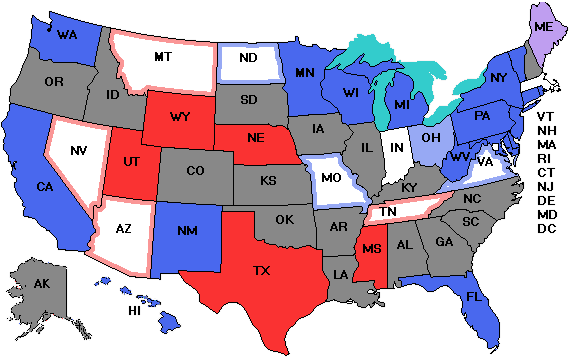
|
|
|
|
|
|
|
|
|
|
|
|
|
|
|
|
|
|
|
|
|
|
|
|
|
|
|
|
|
|
|
|
|
|
|
|
|
|
|
|
|
|
|
|
|
|
|
|
|
|
|
|
|
|
|
|
|
|
Introduction to the 2012 Senate Races
There are 23 Democratic Senate seats up for election this year and only 10 Republican seats. Furthermore, of the ten retirements announced so far, seven are Democrats (counting Joe Lieberman as a Democrat here) while only three Republicans are retiring. The Democratic seats in Nebraska, New Mexico, North Dakota, Virginia, and Wisconsin are all going to be very competitive and the Republicans could easily pick up some of them. The Democrats have a shot in Arizona, but the Republican running there is the favorite. In Maine, an independent is running and is the overwhelming favorite. If he decides to caucus with the Democrats, like his independent neighbor, Sen. Bernie Sanders (I-VT), that is a likely pickup for the Democrats. All in all, this means the Democrats will have to fight very hard to hang onto the Senate, which they now control 53-47.
The Democratic-held seats are listed first below, in alphabetical order by state, with the Republican ones following.
Click on a picture for the candidate's home page.Click on a name for the candidate's entry in the Wikipedia.
Click on a party (D) or (R) for the state party.
Click on "Polls" for a graph of the polls for that state
Click here for a page with graphs of all Senate polls by state
The
 symbol indicates a race to watch.
symbol indicates a race to watch.
All off-site references open in a new window. Type CTRL (CMD-W on the Mac) in the window to close it.
For a graph showing the predicted 113th Senate daily from January 2012 until today, click here.
Democratic-held seats
California
| Incumbent | Challenger | Notes Polls |

Dianne Feinstein (D) |

Elizabeth Emken (R) |
Dianne Feinstein (DiFi to her many admirers) won her last Senate race by 25 points. This time the margin will be even bigger. In 2010, the Republicans had a very strong (read: extremely wealthy) Senate candidate (Carly Fiorina) and the Democrat, Barbara Boxer, still won by 10 points. Emken, a totally unknown autism activist, came in second, with 12% of the vote, in California's new jungle primary, beating Orly Taitz, the queen of the birthers, and a host of even lesser-known candidates. With no money, no issue, and no name recognition in a very blue state, running against one of the best-known politicians in the state, Emken will go down in flames. |
Connecticut
| Challenger | Challenger | Notes Polls |

Candidate unknown (D) |

Candidate unknown (R) |
Sen. Joe Lieberman (I-CT) lost the Democratic primary in 2006 but ran as an independent and won, largely because the Republicans put up such an awful candidate that most of the Republicans in the state voted for Lieberman. That will not happen in 2012. Many Connecticut Democrats truly hate Lieberman for not accepting the will of the voters, so he would almost certainly go down to defeat in 2012. To prevent being embarrassed, he is retiring. Both parties are going to have nasty primaries this time. Rep. Chris Murphy (D-CT) and former Secretary of State Susan Bysiewicz will go after each other in the Democratic primary, while 2010 multimillionaire candidate Linda McMahon will take on former representative Chris Shays in the Republican one. But no matter who wins the primaries, Connecticut is a moderately blue state, so the Democrat is favored. |
Delaware
| Incumbent | Challenger | Notes Polls |

Tom Carper (D) |

Kevin Wade (R) |
Delaware is a reliably Democratic state and Sen. Tom Carper (D-DE) is well known and popular. Delaware Republicans were spared the embarrassment of another Christine "I am not a witch" O'Donnell run when self-funding businessman Kevin Wade filed to run. He has no chance of winning, but at least this will be a normal race focusing on taxes and other issues rather than on the personality of the Republican nominee as it was in 2010. |
Florida 
| Incumbent | Challenger | Notes Polls |

Bill Nelson (D) |

Connie McGillicuddy (R) |
Florida is the mother of all swing states and will be bitterly fought over in 2012 as usual. With Mitt Romney as the expected Republican nominee, it could be a very close race. In 2006, Nelson faced the deeply flawed and highly unpopular Katherine Harris. This time a slew of candidates are going after the nomination and a lot depends on how bloody the primary is and who wins it. The Republicans' best hope is Rep. Connie Mack IV (R-FL), and initial polling shows that he is way ahead. Unless something shakes up the primary, it will probably be Connie Mack, whose real name is Cornelius McGillicuddy IV. A wildcard here is the Republican nominee for Veep. If it is Sen. Marco Rubio (R-FL), that will help the Republican senatorial nominee. |
Hawaii
| Challenger | Challenger | Notes Polls |

Candidate unknown (D) |

Linda Lingle (R) |
Hawaii is a highly Democratic state and even with an open seat, the Democrat is strongly favored although there will be a primary between Rep. Maizie Hirono (D-HI) and former representative Ed Case. The Republicans' are likely to nominate former governor Linda Lingle. If the Democratic primary is especially bloody--a real possibility--then Lingle might have a shot at it, but if the Democratic winner emerges with some skin still on and some money in the bank, the Democrat is the favorite. |
Maryland
| Incumbent | Challenger | Notes Polls |

Ben Cardin (D) |

Dan Bongino (R) |
Maryland is a reliably Democratic state that Ben Cardin won by 10 points over former Lt. Gov. (later RNC chairman) Michael Steele. Cardin is so safe, that no serious Republican even bothered to get the nomination, even though it was available just by asking. Ultimately, Dan Bongino, a former Secret Service agent got the nod. Cardin will win in a landslide. |
Michigan
| Incumbent | Challenger | Notes Polls |

Debbie Stabenow (D) |

Peter Hoekstra (R) |
Michigan has the highest unemployment in the country and a lot depends on who the voters choose to blame. If they feel it is Obama's fault, Sen. Debbie Stabenow (D-MI) will be in big trouble. But if Obama pushes his jobs bill hard and the congressional Republicans gleefully kill it, their brand could become quite toxic in the state giving Stabenow an easy victory. Also, the bailout of the car companies, much derided in other states, is highly popular here and Stabenow is surely going to claim credit for it. The most likely Republican is Rep. Peter Hoekstra (R-MI). |
Minnesota
| Incumbent | Challenger | Notes Polls |

Amy Klobuchar (D) |

Candidate unknown (R) |
Although Minnesota is fundamentally a blue state (the last Republican presidential candidate to carry the state was Richard Nixon in 1972), Republicans do win senatorial and gubernatorial elections fairly regularly. If the Republicans had a strong candidate, they might be able to give one-term senator Amy Klobuchar (D-MN) a good scare at least, but they don't so they won't. |
Missouri 
| Incumbent | Challenger | Notes Polls |

Claire McCaskill (D) |

Candidate unknown (R) |
Missouri is perennially a swing state that Sen. Claire McCaskill (D-MO) barely won in 2006. She is definitely in the fight of her life this time. In fact, Missouri is probably the Republicans' third best shot at a Senate pickup (after North Dakota and Nebraska). Her one advantage here is that the Republicans understand her vulnerability very well, so there are two top-flight contenders for the nomination, Rep. Todd Akin (R-MO) and former state treasurer Sarah Steelman. If their primary gets nasty, the net effect could be to lower both of their approval ratings enough to let McCaskill slip by again, |
Montana 
| Incumbent | Challenger | Notes Polls |

Jon Tester (D) |

Denny Rehberg (R) |
Sen. Jon Tester (D-MT) narrowly won in 2006 against an incumbent senator, Conrad Burns, but one fond of making outrageous statements. This time Tester will go up against the state's only congressman, Rep. Denny Rehberg (R-MT), who has better mouth control and has won statewide races since 1990. It is likely to be a close race. |
Nebraska
| Challenger | Challenger | Notes Polls |

Bob Kerrey (D) |

Deb Fischer (R) |
In case anyone was wondering why Sen. Ben Nelson (D-NE) has been such a gigantic pain in the tush to the Democrats for the last two years, the reason should now be clear: he had to win an election in an extremely red state in 2012. After much agonizing, he finally decided having to constantly fight both parties wasn't worth it, so he will retire at the end of his term. After much begging, the national Democratic Party convinced former Nebraska governor and senator, Bob Kerrey, to go for another hurrah. The Republican establishment settled on Attorney General Jon Bruning, but he was defeated by state senator Deb Fischer, who is supported by the tea party. As a result, we may see a competitive general election here. |
New Jersey
| Incumbent | Challenger | Notes Polls |

Bob Menendez (D) |

Joseph Kyrillos (R) |
Although New Jersey elects Republican governors fairly regularly, like other states in the Northeast, it is largely a Democratic bastion and Sen. Bob Menendez shouldn't have too much trouble getting reelected, especially since the Republicans do not have a top-tier opponent. The most likely Republican is state senator Joseph Kyrillos, who is close to Gov. Chris Christie, but he first has to win a primary and then will be hit hard by Menendez' $8 million war chest. |
New Mexico 
| Challenger | Challenger | Notes Polls |

Martin Heinrich (D) |

Heather Wilson (R) |
The surprise retirement of Sen. Jeff Bingaman (D-NM) means that the Republicans have a shot at winning a seat in this increasingly blue state. However, neither party had an obvious candidate, so there was competitive primaries in both parties. Rep. Martin Heinrich (D-NM) defeated state auditor Hector Balderas in the Democratic primary and will face former representative Heather Wilson (R) in November. Wilson ran for the Senate in 2008, but lost the primary election to congressman Steve Pearce, who went on to lose the general election to Democrat Tom Udall. |
New York
| Incumbent | Challenger | Notes Polls |

Kirsten Gillibrand (D) |

Candidate unknown (R) |
Sen. Kirsten Gillibrand (D-NY) was appointed to Hillary Clinton's seat when she was named Secretary of State. At first, many on the left were very negative about her as a result of her voting record in the House when she represented a rural district near Albany. But after joining the Senate, she moved sharply to the left, saying her job was to represent her constituents and now she represented a lot more of them. The voters bought that and she won a special election in 2010 with ease. She will win in 2012 equally easily and will be seen as a rising star within the Democratic Party. Three Republicans, all of them second tier or lower, have announced they are running: George Maragos, the Nassau County comptroller, congressman Bob Turner, and lawyer Wendy Long. None of them have a prayer. |
North Dakota 
| Challenger | Challenger | Notes Polls |

Heidi Heitkamp (D) |

Rick Berg (R) |
With the unexpected retirement of Sen. Kent Conrad (D-ND), the Democrats are going to be hard pressed to keep this seat, no matter who wins the Republican primary. Rep. Rick Berg (R-ND) has already won statewide here and shouldn't have any trouble doing that again if he is the nominee, which is likely. |
Ohio
| Incumbent | Challenger | Notes Polls |
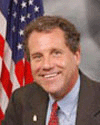
Sherrod Brown (D) |

Josh Mandel (R) |
Ohio is perennially a swing state at all levels but Sen. Sherrod Brown (D-OH) is a tough campaigner who unseated an incumbent Republican senator, Mike DeWine, in 2006. The Republicans are running 33-year-old state Treasurer Josh Mandel, a proven fundraiser. But the unions' victory in repealing the law limiting collective bargaining for state employees will help Brown since he strongly favored repeal and is popular in union households. |
Pennsylvania
| Incumbent | Challenger | Notes Polls |

Bob Casey (D) |

Tom Smith (R) |
Sen. Bob Casey (D-PA) is a Blue Dog Democrat (opposes abortion, etc.) so it will not be easy for the Republicans to label him as "too liberal." James Carville once described Pennsylvania as: "Philadelphia and Pittsburgh with Alabama in between." Casey is just liberal enough that he is tolerated in Philadelphia and Pittsburgh and just conservative enough that he is tolerated in between. Wealthy coal executive Tom Smith spent $5 million of his own money to capture the Republican senatorial nomination. However, in the general election with President Obama on top of the ticket, a high turnout is expected in Philadelphia and Pittsburg and this may be enough to help Casey to a second term. |
Rhode Island
| Incumbent | Challenger | Notes Polls |

Sheldon Whitehouse (D) |

Barry Hinckley (R) |
Rhode Island is a heavily Democratic state so Sheldon Whitehouse will win reelection easily. In fact, he is so safe that no serious Republican even bothered to file for the election. A young software entrepreneur was the only candidate so he got the nomination by default, but it hardly matters. |
Vermont
| Incumbent | Challenger | Notes Polls |

Bernie Sanders (I) |

John MacGovern (R) |
Bernie Sanders is the only openly socialist member of Congress, but he is immensely popular in Vermont and will win in a walk. Although technically Sanders is an independent, he caucuses with the Democrats and they won't run anyone against him, leading to the odd situation of no Democrat running for the Senate in a very blue state. Although the Republicans are not going to waste any money on this race, a rich businessman, John MacGovern, filed for the nomination and got it. Unlike nearly all other rich businessmen who try for high office, MacGovern has actually held elected office before--four terms in the Massachusetts state house before he moved to Vermont. But despite this experience, he has no chance against Sanders. |
Virginia 
| Challenger | Challenger | Notes Polls |

Tim Kaine (D) |

George Allen (R) |
Sen. Jim Webb (D-VA) won a real squeaker against George "Macaca" Allen in 2006 and probably could have beaten him again this time, but decided that politics isn't so much fun after all. Since Allen, a former senator and former governor of the commonwealth, is the likely Republican nominee, the Democrats had to find a serious candidate quickly. They settled on Obama's handpicked DNC chairman, former Virginia governor Tim Kaine. Kaine is well liked in the state and a lot will depend on how well Obama does in the state, which he carried in 2008. Virginia has become a purple state, largely due to an influx of northerners in the counties close to D.C., and both the presidential and senatorial races are expected to be close. |
Washington
| Incumbent | Challenger | Notes Polls |

Maria Cantwell (D) |

Candidate unknown (R) |
Washington is becoming an increasingly blue state and unless the Republicans can come up with a top-tier candidate, Maria Cantwell will probably be relected, albeit by a modest margin rather than a landslide. Possible Republicans include representatives Cathy McMorris Rodgers and Dave Reichert, but they are far from certain candidates. |
West Virginia
| Incumbent | Challenger | Notes Polls |
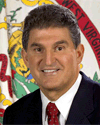
Joe Manchin (D) |
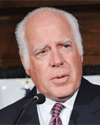
John Raese (R) |
Sen. Joe Manchin (D-WV) won a special election to replace the late Sen. Robert Byrd (to the extent anyone can replace the legendary Byrd) but now he is running for a full term. Before he was senator, he was an immensely popular governor. He has crossed swords with the Obama administration enough times that the Republicans will have a tough time tying him closely to the President, who is not popular in West Virginia. The Republican nominee is John Raese, a candidate whose occupation is running for statewide office in West Virginia. He has done so in 1984, 1988, 2006, 2008, and 2010 with no success. After it became known that his wife is registered to vote in Florida, where he actually lives and where their children go to school, any possibility that he might win in this reddish state evaporated. |
Wisconsin 
| Challenger | Challenger | Notes Polls |

Tammy Baldwin (D) |

Candidate unknown (R) |
The Democrats were hit by a double whammy here. On the one hand, their well-entrenched, extremely wealthy, popular incumbent, Sen. Herb Kohl (D-WI) decided to retire at 76, even though he could have been easily elected to the Senate another two or three times if he lived long enough. To make this worse, their strongest candidate by far, former senator Russ Feingold, decided not to run for his seat, even though he would have been the odds-on favorite. Most likely, Rep. Tammy Baldwin (D-WI) will get the Democratic nomination. The Republicans have two serious candidates, former governor Tommy Thompson and former representative Mark Neumann. It could be a big fight between them. In any event, Kohl's retirement turned a sure-fire Democratic hold into a pitched battle. |
Republican-held seats
Arizona 
| Challenger | Challenger | Notes Polls |

Jeff Flake (R) |

Richard Carmona (D) |
The Republican nominee will be Rep. Jeff Flake (R-AZ). If she hadn't been shot, Rep. Gabby Giffords (D-AZ) would probably have run for the open Senate seat here, but she decided to resign from Congress and not run for the Senate. Consequently, the Democrats looked elsewhere, and came up with Richard Carmona, a former Surgeon General. As a Latino in a state with a growing Latino population and a Vietnam veteran, he might give Flake a serious challenge. |
Indiana 
| Challenger | Challenger | Notes Polls |

Richard Mourdock (R) |

Joe Donnelly (D) |
In a nasty primary, state Treasurer Richard Mourdock, a tea-party favorite, defeated six-term incumbent Richard Lugar for the right to face Rep. Joe Donnelly (D-IN) in November. Republicans are fearing and Democrats are hoping that this race will be a repeat of the 2010 Senate races in Colorado, Delaware, and Nevada, in which tea party candidates upset the establishment favorites in the primaries only to go down to defeat in the general election. Indiana is normally a red state, but Democrats Birch Bayh and his son Evan Bayh served a total of five terms in the Senate representing Indiana, so this will be a competitive race. Mourdock will try to appeal to conservatives while Donnelly will say he is more interested in solving problems for the people of Indiana than he is in ideological purity. |
Maine 
| Challenger | Challenger | Challenger | Notes Polls |

Charlie Summers (R) |

Cynthia Dill (D) |

Angus King (I) |
With Olympia Snowe's sudden retirement, this seat suddenly became the the Democrat's #1 pickup opportunity. When former Democrat and former governor Angus King announced he was running as an independent, it shook up the race completely and scared off all the serious Democrats who were afraid of a three-way race which would allow the Republican to eke out a win. King has refused to say who he will caucus with, but observers expect him to caucus with the Democrats, like Sen. Bernie Sanders (I-VT). As a consequence, the Democratic primary was among relatively unknown candidates, with both of the state's representatives declining to run. A key issue here is whether King, who is strongly favored to win, gives private assurances to the Democrats that he will caucus with them. If he does (even if he denies it in public), they will essentially sabotage their own candidate, Cynthia Dill, to avoid a repeat of the 2010 three-way gubernatorial race, in which an independent in the race split the vote, resulting in a tea-party Republican, Paul LePage being elected governor. |
Massachusetts 
| Incumbent | Challenger | Notes Polls |
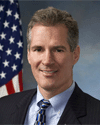
Scott Brown (R) |

Elizabeth Warren (D) |
This is the seat second most likely to flip in the Senate. Scott Brown won a special election to fill the seat of the late senator Ted Kennedy, but he had the good fortune to be running against a lazy and arrogant candidate who felt that campaigning was beneath her dignity. That won't happen again. Most likely he will face Elizabeth Warren, a Harvard professor and strong consumer rights advocate, who will pull in tons of out-of-state money and who took the lead in the polls within a month of entering the race. Still, Brown has a lot of money in the bank. |
Mississippi
| Incumbent | Challenger | Notes Polls |
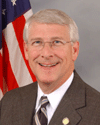
Roger Wicker (R) |

Albert Gore (D) |
It is hard to imagine why a Democrat would want to run against Roger Wicker since no matter what, Wicker will win in a landslide. Nevertheless, a retired Army colonel, Albert Nottly Gore, Jr. filed for the nomination and won the primary against even lesser known candidates. |
Nevada 
| Incumbent | Challenger | Notes Polls |

Dean Heller (R) |

Shelley Berkley (D) |
Dean Heller was appointed to the Senate by Gov. Brian Sandoval (R-NV) when the Republican Senate caucus basically forced John Ensign out of the race due to his long-term affair with the wife of one of his staffers followed by a very clumsy attempt to buy everyone's silence. Nevada has become a purple state which Obama carried easily in 2008 and with him on the top of the ticket again in 2012, Rep. Shelley Berkley (D-NV), the likely Democratic nominee, has a good shot at knocking him off. In addition, voters tend not to like appointed senators except in very red or very blue states, which Nevada is not. |
Tennessee
| Incumbent | Challenger | Notes Polls |

Bob Corker (R) |

Candidate unknown (D) |
Sen. Bob Corker (R-TN) is a shoo-in for reelection as the Democratic bench in Tennessee is not deep at all. |
Texas
| Challenger | Challenger | Notes Polls |

Candidate unknown (R) |

Candidate unknown (D) |
With Sen. Kay Hutchison (R-TX) retiring, the Democrats have an outside shot of winning this seat because the Latino population keeps growing and is heavily Democratic. Also, nearly a dozen Republicans are running in the primary and they could bloody each other pretty badly and end up tired and broke. The Democrats don't have a candidate either, but a free for all is less likely. On the other hand, if no serious candidate decides to go for it, the Republican will win by default. |
Utah
| Incumbent | Challenger | Notes Polls |
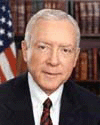
Orrin Hatch (R) |

Scott Howell (D) |
Winning statewide elections in Utah is something Democrats don't do very often so it is a safe bet that a Republican will be elected to the Senate in 2012. But which one? Orrin Hatch is a deeply conservative Republican, but so was Bob Bennett but that didn't save him from coming in third at the state Republican convention in 2010 and thus not even making it to the primary ballot. Hatch did better than Bennett, coming in first in the convention, but not by enough to avoid a primary with tea party favorite Dan Liljenquist. Hatch is likely to win the primary. The Democrats nominated former state senate minority leader Scott Howell, but he has no chance against Hatch and probably no chance against Liljenquist, either. |
Wyoming
| Incumbent | Challenger | Notes Polls |

John Barrasso (R) |

Candidate unknown (D) |
Sen. John Barrasso was appointed to the Senate in 2007 by then governor Dave Freudenthal (D-WY) after the death of Sen. Craig Thomas (R-WY). Normally a governor would appoint a member of his own party to fill a Senate seat, but Wyoming law states that the state party of the senator who died or resigned must pick three candidates and the governor must choose one of them. Freudenthal picked Barrasso as the weakest of the three, but he still won a special election in 2008 to fill out the remainder of Thomas' term. Now he is running for a full term and will win easily, no matter who the Democrats put up. |
